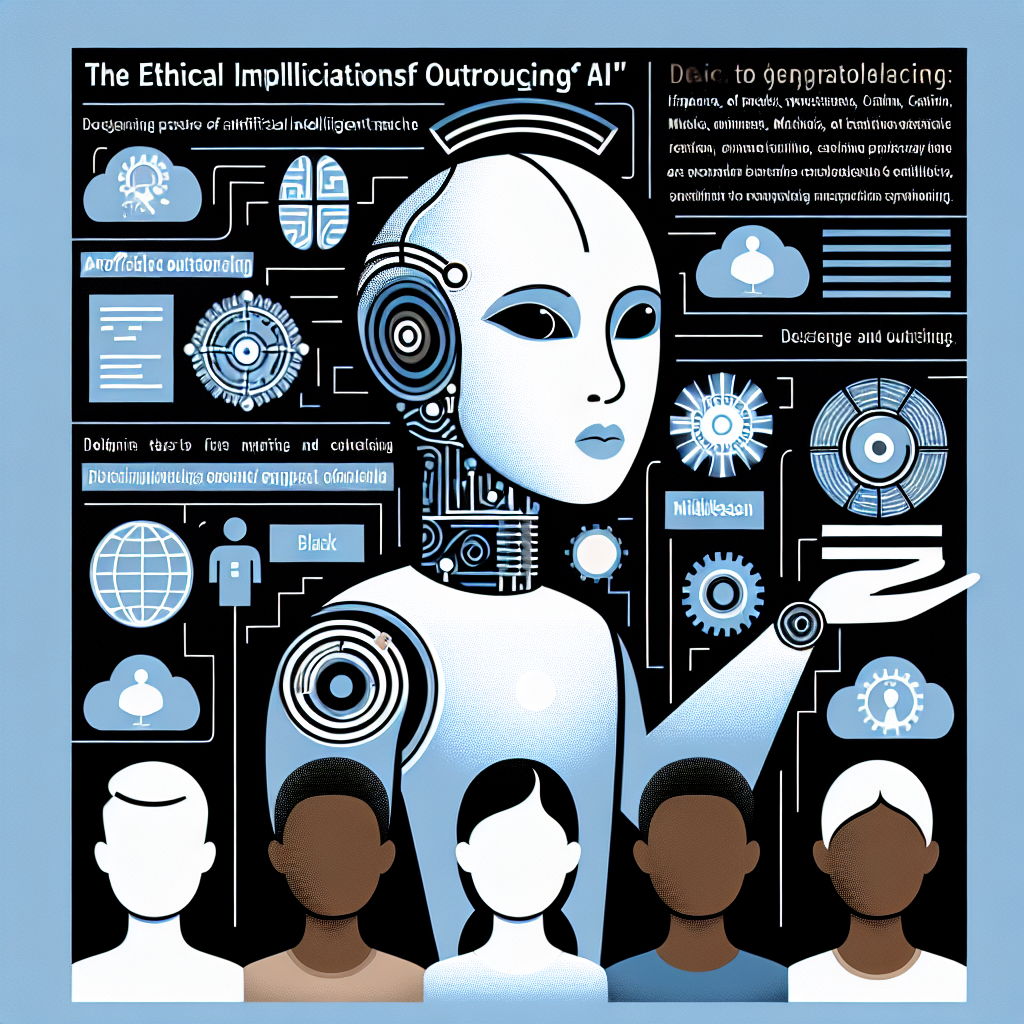The Ethical Implications of AI Outsourcing
Artificial Intelligence (AI) has become an integral part of many industries, from healthcare to finance to transportation. Companies are increasingly turning to AI to streamline processes, improve decision-making, and enhance customer experiences. However, as the use of AI becomes more widespread, ethical concerns have also come to the forefront. One particular issue that has gained attention is the ethical implications of outsourcing AI development and implementation.
Outsourcing AI involves hiring a third-party company to develop, maintain, or operate AI systems on behalf of the client organization. This can range from simple tasks like data labeling to more complex activities like creating AI algorithms. While outsourcing can offer cost savings, access to specialized expertise, and faster time-to-market, it also raises a number of ethical considerations.
One of the key ethical implications of AI outsourcing is the potential for bias in AI algorithms. AI systems are only as good as the data they are trained on, and if that data is biased or incomplete, the AI system will reflect those biases. When companies outsource AI development to third-party vendors, they may not have full visibility or control over the data used to train the AI models. This can lead to unintended biases in the AI system, which can have serious consequences for individuals or groups that are adversely affected.
For example, if an AI system used to screen job applicants is trained on biased data, it may discriminate against certain groups based on race, gender, or other characteristics. This can perpetuate existing inequalities in the workforce and have a negative impact on diversity and inclusion efforts. Companies that outsource AI development must therefore be vigilant in ensuring that the data used to train AI models is representative and unbiased.
Another ethical consideration in AI outsourcing is the potential for job displacement. As AI systems become more sophisticated, they are increasingly able to perform tasks that were previously done by humans. This has led to concerns about job loss and economic inequality. Companies that outsource AI development may be seen as contributing to this trend by automating tasks and reducing the need for human workers.
Additionally, there are concerns about the impact of AI outsourcing on data privacy and security. AI systems often require access to large amounts of data in order to learn and improve over time. Companies that outsource AI development may be required to share sensitive or proprietary data with third-party vendors, raising concerns about data breaches or misuse. Companies must therefore carefully vet their AI outsourcing partners and establish robust data protection measures to safeguard against potential risks.
In light of these ethical considerations, companies that are considering outsourcing AI development should take a proactive approach to addressing these issues. This can include conducting thorough due diligence on potential vendors, establishing clear guidelines and standards for data privacy and security, and implementing mechanisms for monitoring and auditing AI systems for bias.
Furthermore, companies should engage with stakeholders, including employees, customers, and regulatory bodies, to ensure transparency and accountability in the use of AI technology. By taking a holistic and ethical approach to AI outsourcing, companies can mitigate risks and build trust with their stakeholders.
FAQs:
1. What steps can companies take to mitigate bias in AI algorithms when outsourcing AI development?
Companies can take several steps to mitigate bias in AI algorithms when outsourcing AI development. This includes ensuring that the data used to train AI models is representative and diverse, conducting bias audits on AI systems, and implementing bias mitigation techniques such as algorithmic transparency and fairness testing.
2. How can companies ensure data privacy and security when outsourcing AI development?
Companies can ensure data privacy and security when outsourcing AI development by vetting vendors for their data protection practices, establishing clear data sharing agreements, encrypting sensitive data, and monitoring and auditing AI systems for compliance with data privacy regulations.
3. What are the potential consequences of job displacement due to AI outsourcing?
The potential consequences of job displacement due to AI outsourcing include economic inequality, loss of income and job security for displaced workers, and social unrest. Companies that outsource AI development should be mindful of the impact on their workforce and take steps to retrain and upskill employees affected by automation.
4. How can companies build trust with stakeholders in the use of AI technology?
Companies can build trust with stakeholders in the use of AI technology by being transparent about their AI systems and processes, engaging with stakeholders in dialogue and consultation, and demonstrating a commitment to ethical and responsible AI practices. By fostering trust and accountability, companies can enhance their reputation and credibility in the marketplace.

